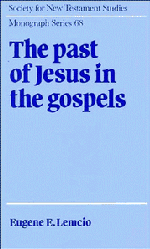Book contents
- Frontmatter
- Contents
- Acknowledgments
- List of abbreviations
- 1 Introduction: faith, kerygma, gospels
- 2 Mark
- 3 Matthew
- 4 Luke
- 5 John
- 6 Summary and implications
- Appendix The unifying kerygma of the New Testament
- Notes
- Bibliography of works cited
- Index of biblical references
- Index of modern authors
- Index of subjects
1 - Introduction: faith, kerygma, gospels
Published online by Cambridge University Press: 06 November 2009
- Frontmatter
- Contents
- Acknowledgments
- List of abbreviations
- 1 Introduction: faith, kerygma, gospels
- 2 Mark
- 3 Matthew
- 4 Luke
- 5 John
- 6 Summary and implications
- Appendix The unifying kerygma of the New Testament
- Notes
- Bibliography of works cited
- Index of biblical references
- Index of modern authors
- Index of subjects
Summary
It would not be melodramatic to say that gospel study has entered a period of heady upheaval. The reigning though tenuous consensus among redaction critics has been dissolving without a newer one to take its place. Methods tried and true have been found wanting by a new generation of critics. The promise of redaction criticism to treat the gospels as wholes has finally been fulfilled by the appropriation of insights outside of biblical studies per se, from literary criticism. In the wake, some intriguing crossovers have occurred. At least one leading critic in the maturity of his career has moved from one discipline to the other.
An opportunist, observing this profusion of many and diverse techniques, might be tempted to ignore standard approaches. Of course a completely idiosyncratic method ought to be viewed with suspicion. But given the “state of the art,” a reasoned fruitful approach sensitive to the gospels themselves and open to debate with opponents should not be turned aside. Such is the apologia offered for what follows. In this chapter, I shall state the thesis of the entire work, describe the method which confirms it, and then anticipate how both might fare among the various “schools” of criticism that dominate academic study of the gospels. However, I shall not merely report what potential objections might be. They will be analyzed and evaluated according to the “logic” and procedure characteristic of each. Of course, such engagement will not end here.
- Type
- Chapter
- Information
- The Past of Jesus in the Gospels , pp. 1 - 29Publisher: Cambridge University PressPrint publication year: 1991



